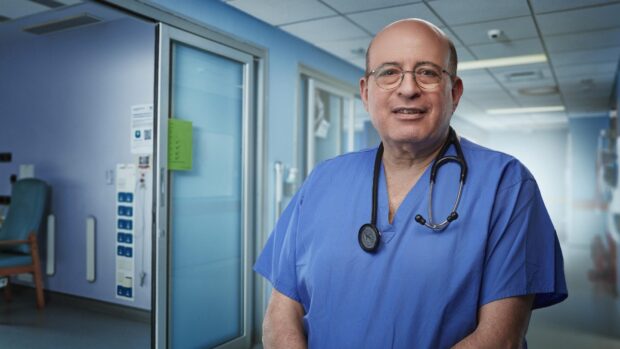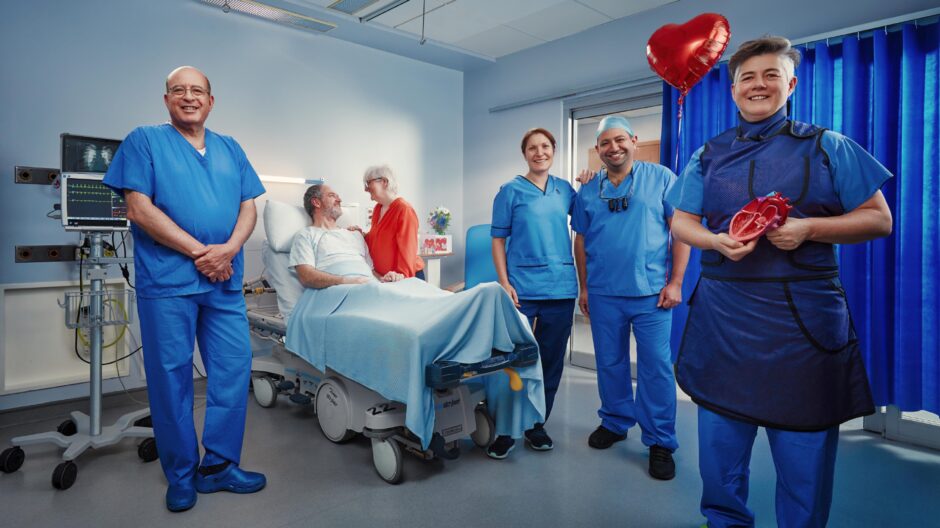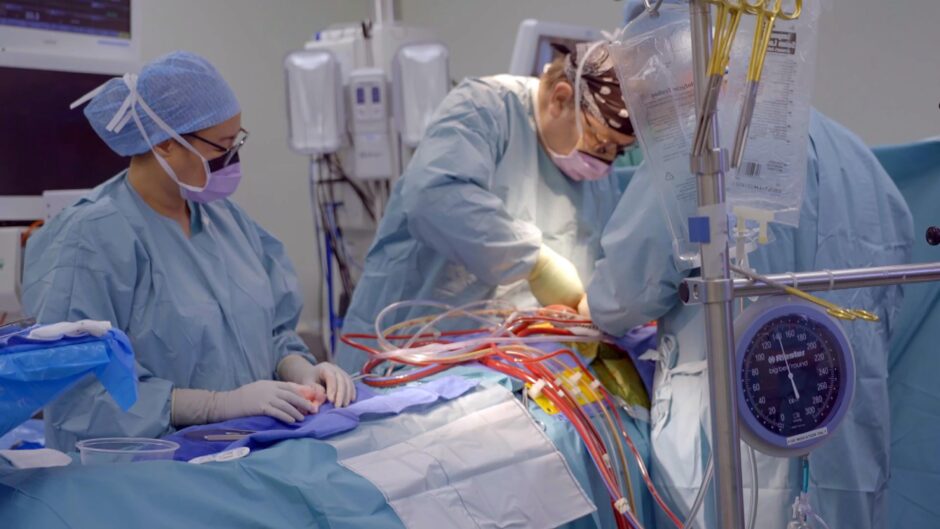
For cardiac staff at the NHS Golden Jubilee in Clydebank, healing hearts goes beyond what goes on in the operating theatre.
Inside one of the UK’s busiest heart hospitals, dedicated and highly-skilled staff at all levels carry out pioneering work that provides care to patients and supports them and their loved ones in the toughest of times.
With heart disease still one of Britain’s biggest killers, taking one person every three minutes, a new documentary has been given behind-the-scenes access, following the hope that flows in the hospital corridors.
More than just a job
“It’s not just a job,” said leading cardiologist Professor Hany Eteiba, one of the staff featured in Channel 5’s series The Hospital: Life on the Line.
“It’s a passion. It’s dedication. It’s commitment. People don’t consider it as just coming to work, they are coming to their hobby, their love, their passion and that makes it truly unique.
“If it wasn’t for the extra mile that every single individual is delivering, we would not be here.”
"Your world can be turned upside down in an instant. The world class team at NHS Golden Jubilee near work tirelessly to bring loved ones back from the brink."
4-part documentary series 'The Hospital: Life on the Line' starts on Monday ❤@channel5uk#C5TheHospital pic.twitter.com/QR1z80p1F8— NHS Golden Jubilee (@JubileeHospital) June 1, 2024
The four-part series, which begins on Monday, showcases the skill and dedication of specialist staff and the journeys for patients and their families, mending hearts both physically and emotionally.
“It was done very smoothly,” explained Professor Eteiba, president-elect of the Royal College of Physicians and Surgeons of Glasgow.
“The team was there for quite a few months, and integrated well with our staff and were very responsive to the clinical needs. They would step back if the situation dictated, they were excellent.
“It’s a real life story, not scripted. It was spontaneous, natural and truly authentic.”
That authenticity means that, as well as celebrating successes and positive outcomes, the tough moments at the Golden Jubilee are also included.
In one scene, a surgeon delivers the devastating news that a long-awaited heart for 54-year-old patient Andy isn’t viable for transplant and has to defer to science and wait for another to become available.
“The proper training and experience alongside the teamwork does help people to overcome the challenges,” Professor Eteiba said. “Importantly, we also share successes.
“We know that the unfavourable outcome or challenging situation is not due to failure or omission. It’s more due to being beyond what the human aspect of medicine can deliver.
“We have a pause after any event that might have been difficult and all the team share their experience, air their emotions. Sharing is really cutting the problem into half, and is very important among the team.”
A world-renowned centre
The hospital was an unsuccessful private facility before being bought by the Scottish Executive in 2002 to be used by the NHS and renamed the Golden Jubilee National Hospital.
Now, it carries out on average 1400 cardiac surgery procedures per year, and 32 heart transplants in the last year. It has the fastest time between patients arriving and their procedures for a UK cardiac centre.
“When I started the speciality 25-30 years ago in the city there were two people that could do what I can do,” Professor Eteiba said. “Now you have 12 in one place that can deliver.
“The team, the government and the board have made one of the most renowned heart and lung centres in the world – that’s no exaggeration.
“In the UK, we have the largest volume of interventional cardiologists and, last year, we were the largest cardiac transplant centre.”
The public’s perception of the hospital is also positive.
Underneath a post of the documentary trailer on the Golden Jubilee’s Facebook page are countless comments praising the staff and the life-saving treatment they’ve provided.
“What we get as feedback is absolutely outstanding and heartening to see the satisfaction and more than that the trust of the public in what we deliver,” Professor Eteiba added.
“Trust is a time, process, decision and outcome dependent phenomena. When people see the positive experience of others, that gives them comfort that they’re at the right place, looked after by the right trained, well-experienced team and that is half the battle through to recovery.
“Treatment is what you are here for, but healing is a much longer process that we are also part of with our team.”
Hospital teamwork
Professor Eteiba is keen to highlight the collective effort in the hospital beyond just the doctors and nurses. That includes the likes of the hospital porters, who by being adaptive and quick on their feet can save vital minutes for patients on the brink.
“They do it with pride, sharing their experience and their commitment and compassion about helping people. It might be five minutes but it might make the whole difference.
“The whole team is behind it and I’m hoping this will be quite clear in the program.”
Professor Eteiba also hopes the documentary highlights what more we can be doing when it comes to potentially life-saving skills that can be easily learned, such as CPR and how to use defibrillators.
“The more we educate in schools and universities, the more chance we will have of people surviving.
“In Scandinavian countries, almost 25% who had out of hospital cardiac arrest and are transferred to hospital for treatment will leave there alive.
“In the UK, it is only 10% and the only difference is the public is more well-educated and more informed about how to deal with collapsed patients.”
The Hospital: Life on the Line, Monday, Channel 5, 9pm

Enjoy the convenience of having The Sunday Post delivered as a digital ePaper straight to your smartphone, tablet or computer.
Subscribe for only £5.49 a month and enjoy all the benefits of the printed paper as a digital replica.
Subscribe © BBC Studios / Channel 5 Television
© BBC Studios / Channel 5 Television © BBC Studios / Channel 5 Television
© BBC Studios / Channel 5 Television